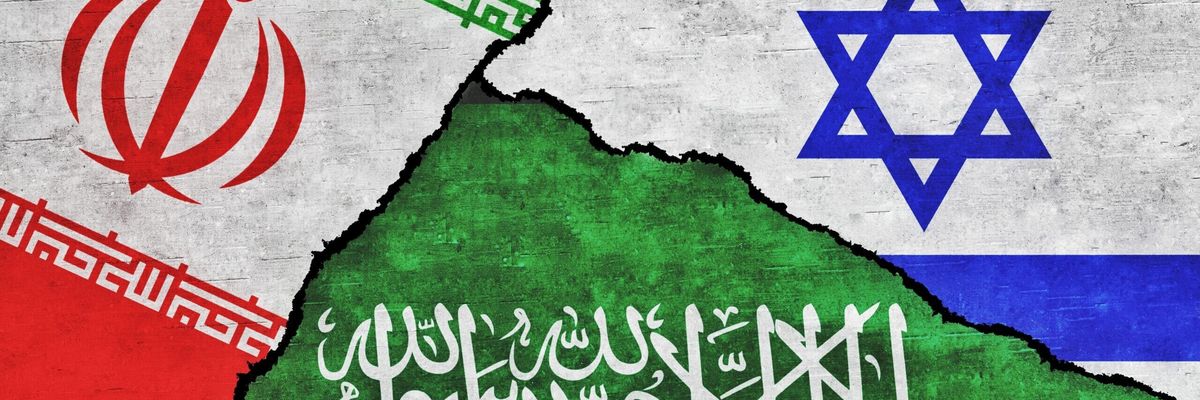For Prime Minister Benjamin Netanyahu and basically all Israeli officials, bringing Saudi Arabia into the Abraham Accords is an important foreign policy goal. Yet, Saudi Arabia’s pre-condition for normalization is Israel returning to the 1949-67 borders and permitting the Palestinians to have a state with its capital in East Jerusalem, which is anathema to the Netanyahu-led government.
Nonetheless, even short of normalization, Riyadh and Tel Aviv have found much common cause in the region, particularly with respect to Iran. It has been widely understood that shared threat perceptions of Tehran will push Saudi Arabia and Israel toward de facto normalization.
Yet, there is much anxiety among Israeli officials in light of the Chinese-brokered diplomatic agreement which Saudi Arabia and Iran reached on March 10. As the Israelis see it, Riyadh’s decision to resume diplomatic relations with the Islamic Republic and talk about investing “very quickly” in the Iranian economy are both extremely problematic.
News of this Saudi-Iranian diplomatic deal reportedly caught Netanyahu off guard. This significant development has been playing out in Israel’s tense domestic political arena with both the ruling coalition and opposition figures trading blame.
“The Israelis see [the Saudi-Iranian diplomatic agreement] as a major strategic setback. Iran is their primary security challenge, a powerful adversary with long tentacles across the Middle East,” Ferial Saeed, a former senior American diplomat, told Responsible Statecraft. “They thought they were building a strong anti-Iran coalition in the region, and now Iran’s other main rival and the most powerful Arab state, lynchpin of any regional alliance to counter Tehran, is shaking hands with Iran before normalizing with Israel.”
Saeed pointed out how “the negative Israeli reaction to the deal also stands in sharp contrast to the rest of the region’s cautious welcome. It worsens Israel’s position in the region.”
In an interview with Responsible Statecraft, Dr. Nader Hashemi, the director of the Center for Middle East Studies at the University of Denver's Josef Korbel School of International Studies, described the Israeli view of this diplomatic deal between Riyadh and Tehran as a “very warped perception and a gross overreaction rooted in hubris and arrogance that often goes with political power.”
Nonetheless, Saudi Arabia resuming diplomatic relations with Iran will not change Riyadh’s fundamental threat perceptions of the Islamic Republic. Therefore, Saudi Arabia will likely continue viewing Israel as a regional power which Riyadh can work with albeit somewhat covertly to keep pressure on Iran. “Israel is presumably reexamining the premise that concerns about Iran are absolutely paramount for countries in the Gulf,” Gordon Gray, the former U.S. Ambassador to Tunisia, told Responsible Statecraft. “At the same time, Saudi Arabia is likely to continue its low visibility cooperation with Israel.”
Dr. Hashemi has a similar assessment. “There is a common and similar reading of the future of the region and the current security challenges more than there is any sort of agreement between Iran and Saudi Arabia. The fundamental tensions and differences in values and worldview between Saudi Arabia and Iran with respect to their view of the region still remain in place.”
When addressing Riyadh’s potential ability to maintain diplomatic relations with Tehran amid a period of Saudi-Iranian détente while also discreetly cooperating with Israel, Saeed said that “it all depends on how much Iran reins in proxies that threaten Saudi security. Unleashing them is a lot easier than putting them back in the bottle.” The former U.S. diplomat explained that if the Kingdom sees “meaningful improvement” from Tehran that would make the Saudis “more cautious and choosy in where and how they cooperate with Israel to counter Iran.”
At this juncture it's likely that if the Israelis would carry out a military strike against Iran, they would probably not have access to Saudi airspace or any military facilities in the Kingdom. Practically, this would make such an operation targeting Iran’s nuclear facilities far more difficult to conduct.
Mindful of Iran-backed attacks on tankers and energy facilities in the Gulf during 2019, Saudi Arabia and other Gulf Cooperation Council members have become quite increasingly nervous about how Tehran might lash out against others in the neighborhood if attacked. The Saudi leadership is determined to ensure that if brinkmanship between the U.S. and Israel on one side and Iran on the other spirals out of control the Kingdom will not be targeted by Tehran.
As Dr. Aziz Alghashian, a fellow at the Arab Gulf States Institute in Washington, told Responsible Statecraft that there is a difference in how Riyadh and Tel Aviv want to approach Iran and deal with what both countries agree is a major Iranian threat. “Iranian influence is a broad concept which I believe Saudi and Israel believe in, but antagonizing Iran is where Saudi and Israel diverge fundamentally.”
As the Saudis and Iranians test the extents and limits of détente, it will be critical to monitor how Saudi Arabia and Israel’s divergent approaches to dealing with the perceived Iranian threat impact their cooperation more broadly.
















